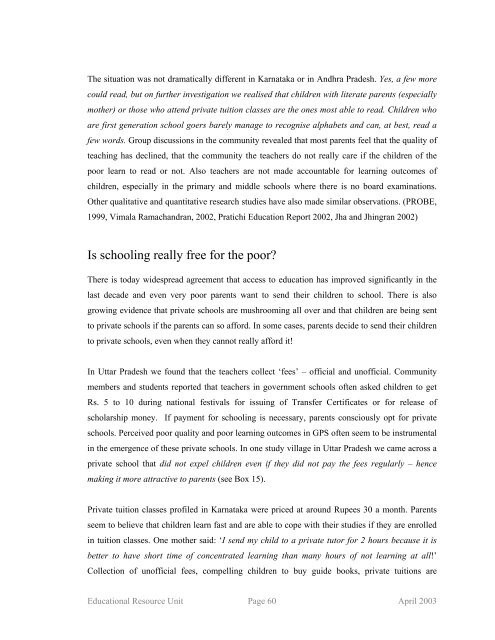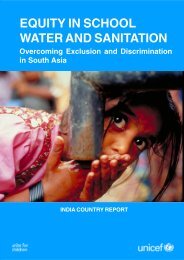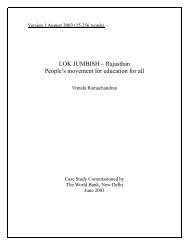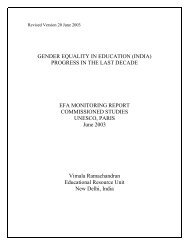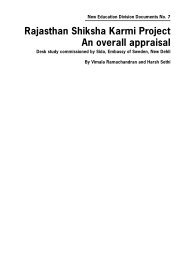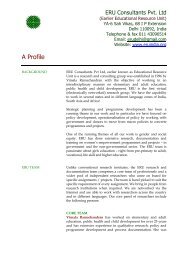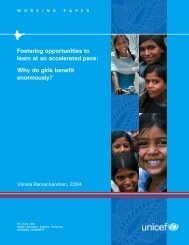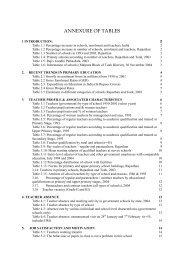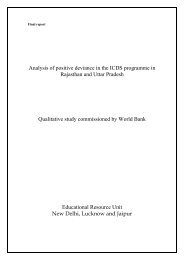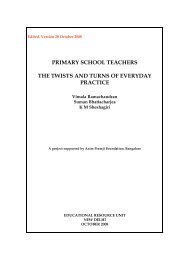Snakes and Ladders - ERU Consultants Pvt. Ltd.
Snakes and Ladders - ERU Consultants Pvt. Ltd.
Snakes and Ladders - ERU Consultants Pvt. Ltd.
Create successful ePaper yourself
Turn your PDF publications into a flip-book with our unique Google optimized e-Paper software.
The situation was not dramatically different in Karnataka or in Andhra Pradesh. Yes, a few more<br />
could read, but on further investigation we realised that children with literate parents (especially<br />
mother) or those who attend private tuition classes are the ones most able to read. Children who<br />
are first generation school goers barely manage to recognise alphabets <strong>and</strong> can, at best, read a<br />
few words. Group discussions in the community revealed that most parents feel that the quality of<br />
teaching has declined, that the community the teachers do not really care if the children of the<br />
poor learn to read or not. Also teachers are not made accountable for learning outcomes of<br />
children, especially in the primary <strong>and</strong> middle schools where there is no board examinations.<br />
Other qualitative <strong>and</strong> quantitative research studies have also made similar observations. (PROBE,<br />
1999, Vimala Ramach<strong>and</strong>ran, 2002, Pratichi Education Report 2002, Jha <strong>and</strong> Jhingran 2002)<br />
Is schooling really free for the poor?<br />
There is today widespread agreement that access to education has improved significantly in the<br />
last decade <strong>and</strong> even very poor parents want to send their children to school. There is also<br />
growing evidence that private schools are mushrooming all over <strong>and</strong> that children are being sent<br />
to private schools if the parents can so afford. In some cases, parents decide to send their children<br />
to private schools, even when they cannot really afford it!<br />
In Uttar Pradesh we found that the teachers collect ‘fees’ – official <strong>and</strong> unofficial. Community<br />
members <strong>and</strong> students reported that teachers in government schools often asked children to get<br />
Rs. 5 to 10 during national festivals for issuing of Transfer Certificates or for release of<br />
scholarship money. If payment for schooling is necessary, parents consciously opt for private<br />
schools. Perceived poor quality <strong>and</strong> poor learning outcomes in GPS often seem to be instrumental<br />
in the emergence of these private schools. In one study village in Uttar Pradesh we came across a<br />
private school that did not expel children even if they did not pay the fees regularly – hence<br />
making it more attractive to parents (see Box 15).<br />
Private tuition classes profiled in Karnataka were priced at around Rupees 30 a month. Parents<br />
seem to believe that children learn fast <strong>and</strong> are able to cope with their studies if they are enrolled<br />
in tuition classes. One mother said: ‘I send my child to a private tutor for 2 hours because it is<br />
better to have short time of concentrated learning than many hours of not learning at all!’<br />
Collection of unofficial fees, compelling children to buy guide books, private tuitions are<br />
Educational Resource Unit Page 60 April 2003


